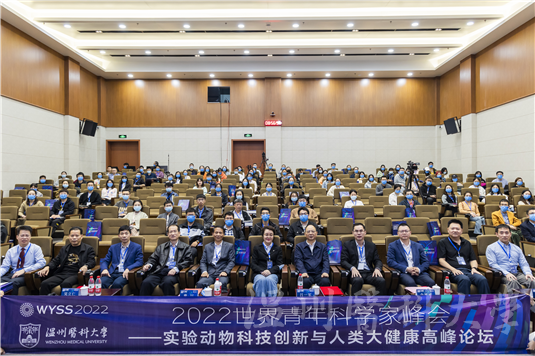- Developing veterinary medicine, contributing to active health: The Laboratory Animal Science and Technology Innovation and Human Health Summit Forum was successfully held
- Author:laboratory Animal Resources Center Date:November 25, 2022
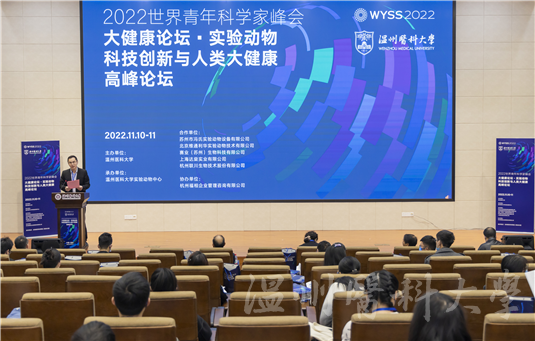
From November 10 to 11, the Laboratory Animal Science and Technology Innovation and Human Health Summit Forum was held online and offline in the lecture hall of the Biomedical Research Building at Wenzhou Medical University. Lyu Yijun, secretary of the Party Committee of WMU, attended the opening ceremony and delivered a speech. Academician and President Li Xiaokun delivered a keynote speech. Vice President Jin Shengwei presided over the opening ceremony. Li and Professor Qin Chuan, chair of the Chinese Association for Laboratory Animal Sciences, were the chairpersons of the forum and Researcher Lin Zhuofeng, director of WMU's Laboratory Animal Center, served as the executive chairman.

Lyu Yijun said that the occurrence and development of human diseases are very complex, and there is an urgent need for experts and scholars at home and abroad to work together, use animal models to carry out medical research and new drug development, and provide new ideas and paths for practicing the philosophy of "comprehensive healthcare" and safeguarding people's lives and health. This forum focused on both the country and the world at large, gathered many well-known domestic experts in laboratory animal sciences, life sciences, medical sciences, and other fields, and provided an international and high-level academic exchange platform for promoting the development of veterinary medicine.
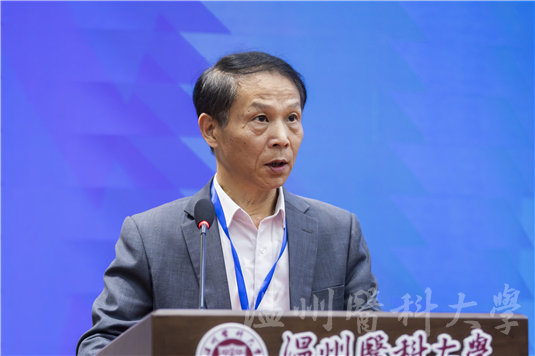
Wu Liren, director of Zhejiang Administration Office of Laboratory Animals, said that the laboratory animal sciences is an interdisciplinary subject with abundant theoretical knowledge, which requires integrated wisdom from the academic, industrial, and practical circles. This forum brought together well-known domestic scholars and experts in laboratory animal sciences, life sciences, and medical sciences, contributing to the development of laboratory animal sciences in Zhejiang.
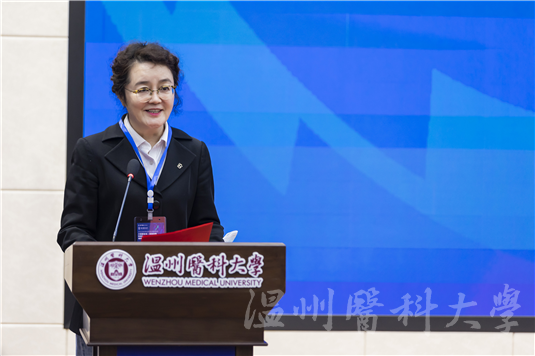
Qin Chuan noted that the report to the 20th National Congress of the Communist Party of China proposed to advance the Healthy China Initiative and give priority to the people's health, which greatly encouraged people working on laboratory animal sciences. To implement the Healthy China Initiative, we need to vigorously develop laboratory animal sciences that will contribute to active health.
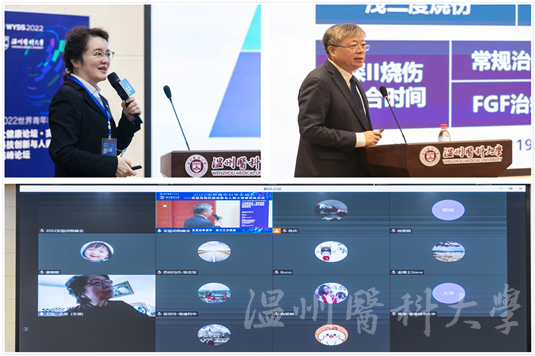
In the keynote speech session, Qin Chuan gave a lecture on "Building Precision Animal Models Using Comparative Medical Technology Systems". Academician Li Xiaokun reported on the Clinical Transformation of Growth Factor Drugs. Professor Xu Aimin at the University of Hong Kong, director of the State Key Laboratory of Pharmaceutical Biotechnology, delivered a report on "Adipose tissue and metabolic health: lessons learned from rodent models". Professor Huang Yu at the City University of Hong Kong delivered a keynote speech on "Vascular reactivity study on myograph in animal models of human diseases".
With the theme of "Developing veterinary medicine, contributing to active health", this forum was divided into special sessions such as the cutting-edge forum, animal research on cardiovascular metabolic diseases, and new technology of laboratory animal research. The participating experts shared a variety of topics including gene editing pigs, genetically modified mouse models, molecular mechanisms of heart failure, vascular changes in fatty hepatitis, inflammation and heart failure, metabolic cardiovascular diseases, atherosclerosis plaques, pulmonary artery hypertension, ischemia/reperfusion injury, LncRNA Gpr137b-ps, conditional gene editing mouse models, animal model selection, hypertensive mouse models, and single-cell sequencing. They discussed the latest technologies for animal models and animal research on cardiovascular metabolic diseases, providing new perspectives and theories for scientific and technological innovation of laboratory animal sciences.
The forum also provided training on laboratory animal regulations and practical skills, and shared expertise in laws and regulations of laboratory animals, laboratory animal IVC system, breeding of special strain animals, animal model production process, and animal metabolism monitoring platform, which was highly relevant to the work and research.
More than 40 experts in the fields of laboratory animal sciences, life sciences, and medical sciences from the mainland and Hong Kong participated in the academic events, including academicians, distinguished young scholars, and Chang Jiang Scholars. The forum attracted more than 200 teachers and students offline and received more than 45,600 views online.
